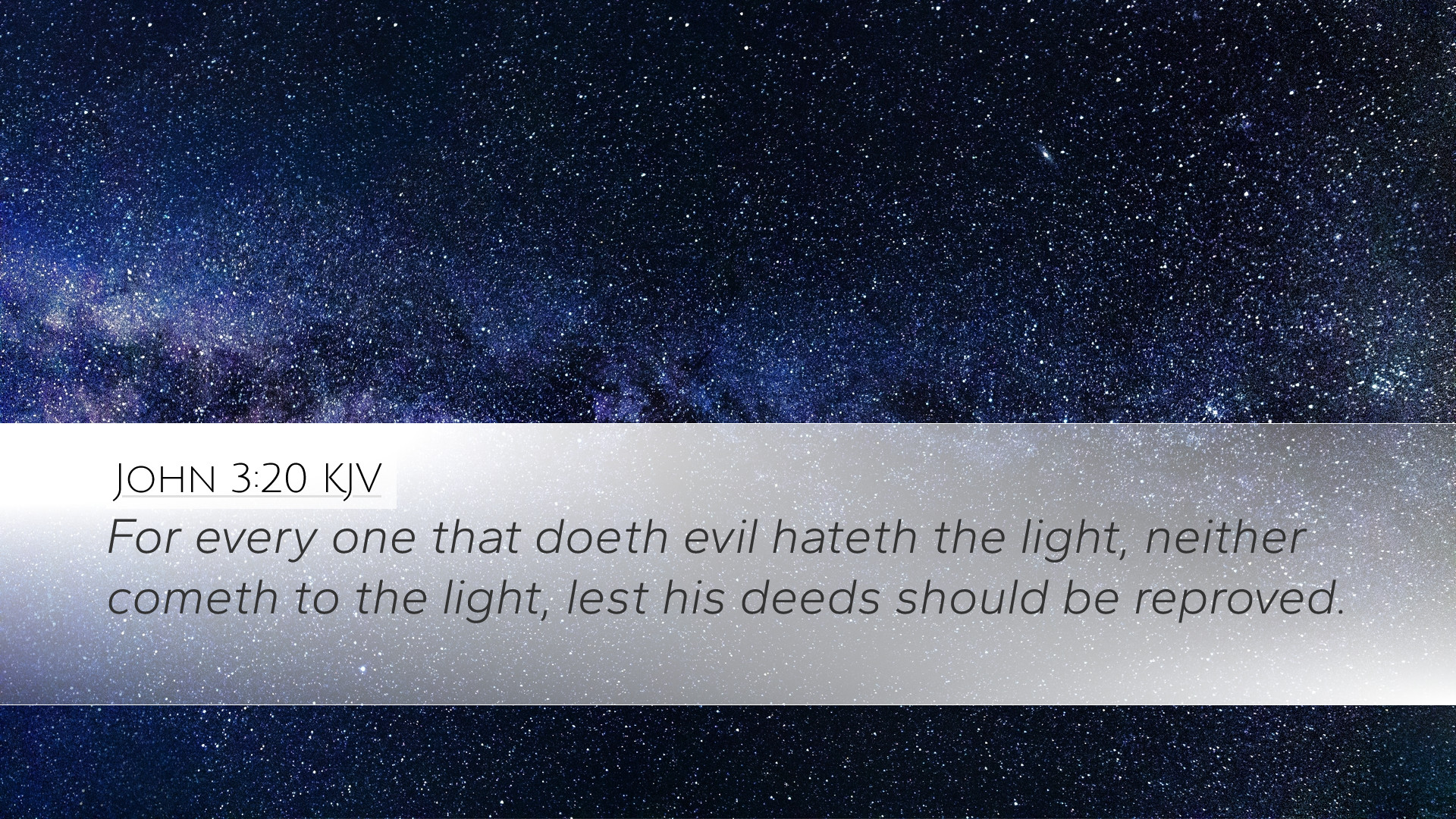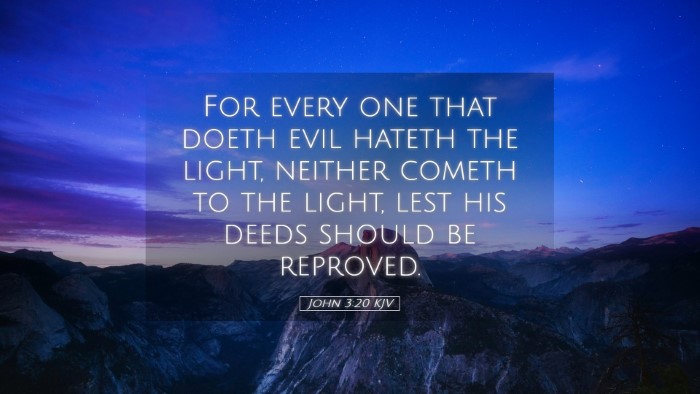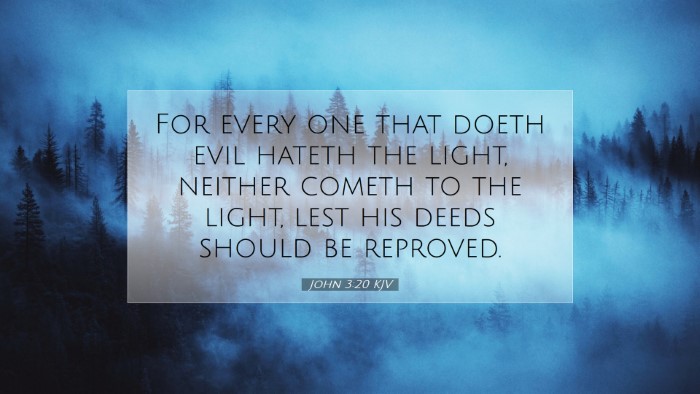Commentary on John 3:20
John 3:20: "For everyone who does wicked things hates the light and does not come to the light, lest his works should be exposed."
Introduction
In this significant verse from the Gospel of John, a profound truth regarding human nature and the divine light is articulated. This passage serves as a stark reminder of the inward struggles individuals experience regarding sin and righteousness. As we delve into the depths of this verse, insights from public domain commentaries will illuminate its meaning and relevance.
Contextual Overview
This verse is situated within a rich dialogue between Jesus and Nicodemus, a Pharisee who sought to understand Jesus' teachings. The overarching theme of John 3 is the new birth and the concept of light versus darkness, which recurs throughout the Gospel. The contrast between light (representing truth and salvation) and darkness (representing sin and judgment) is crucial in understanding this passage.
Matthew Henry's Commentary
Matthew Henry emphasizes the moral implications of coming to the light. He notes that individuals who engage in wickedness inherently oppose the illuminating truth of Christ. According to Henry, this aversion to the light is rooted in the fear of exposure that sin brings. He asserts that the light of Christ compels a response, either drawing individuals closer to it or prompting them to retreat into darkness. This dichotomy reveals the fundamental struggle against the recognition of one's sinful nature.
Albert Barnes' Perspective
Albert Barnes expands on the idea that those who do wicked things not only hate the light but actively avoid it. He explains that this hatred is a manifestation of a guilty conscience. In his exposition, he points out that people prefer to remain in the darkness of their sins rather than confront the reality of their actions. Barnes further elaborates on the consequences of this avoidance, noting that the rejection of light leads to a perpetuation of sin and a hardened heart. The light, representing Christ, serves as both a beacon of hope and a source of conviction.
Adam Clarke's Interpretation
Adam Clarke approaches this verse by examining the nature of light and darkness in a more spiritual context. He discusses how the light signifies God’s holy character and the gospel message. Clarke highlights that the light exposes the truth about human actions, compelling those who live in darkness to reconcile with their nature. He posits that this exposure is not merely punitive but serves as an opportunity for repentance and transformation. Clarke's insights remind us of the grace that accompanies God’s light, inviting sinners to step into truth and away from their destructiveness.
Theological Implications
The theological implications of John 3:20 are profound. The verse underscores the human propensity to sin and the natural aversion to the truth of God. It presents a duality in the relationship between the divine light and human choice. In the realm of soteriology, this passage is pivotal as it illustrates the necessity for individuals to confront their sins in the light of Christ.
Light as Revelation
The concept of light in this verse can be understood as the revelation of God’s moral law and truth. It embodies the conviction that seeks to lead sinners toward repentance. The light of Christ, therefore, is both a call to acknowledge personal sin and an invitation to receive forgiveness. This transformation signifies the start of new life in Christ, pressing believers to embody that light in a world still enveloped in darkness.
The Nature of Sin
The verse articulates the ugly nature of sin and its effects on the human soul. Sin is characterized by a preference for secrecy and a fear of exposure. This preference fosters an environment where individuals can continue in their wickedness unchallenged. Thus, this verse serves as a poignant outline of the human condition—a furtherance of the argument found in Romans 3:23, where all have sinned and fall short of the glory of God.
Pastoral Applications
Pastors can draw several applications from John 3:20 in their preaching and counseling practices. The need for individuals to encounter the light of Christ acts as a call to evangelism and discipleship. Convincing individuals of their need for salvation requires an understanding of the darkness they inhabit.
- Encouragement for Repentance: Pastors can encourage congregants to confront their sins openly and honestly, inspired by the light of Christ.
- Education on Grace: It is crucial to teach the balance between the law, which exposes sin, and grace, which offers redemption.
- Community Support: Creating a safe environment within the church for confessions and accountability helps individuals come to the light.
Conclusion
John 3:20 serves as a compelling reminder of the conflict between light and darkness, showcasing the human inclination to avoid that which exposes our true nature. The commentaries of Matthew Henry, Albert Barnes, and Adam Clarke guide us through the depths of this verse, revealing both the nature of sin and the glory of redemption found in Christ. For students, theologians, pastors, and scholars, this passage is not merely an observation of human behavior but an invitation to contemplate the deeper spiritual truths that God presents through His Son.
Reflection Questions
- How can we ensure that we are not avoiding the light in our personal lives?
- What practical steps can our church take to foster an environment that encourages coming into the light?
- In what ways can we better communicate the grace found in the light of Christ to those who are hesitant to come forward?


